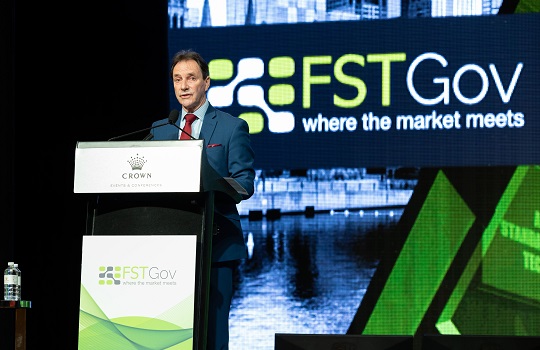
Creating more accessible cyber skills pathways, including a range of programs to attract and boost the participation of women, veterans as well as mid-tier career interns, will prove vital to the overall success and objectives of Victoria’s Cyber Security Strategy, according to the chief information security officer at the Department of Premier and Cabinet (DPC), John O’Driscoll.
The Victorian Government Cyber Security Strategy, launched back in September 2021, is underpinned by three core missions: 1) the safe and reliable delivery of government services, 2) a cyber-safe place to work, live, and learn, and 3) creating a vibrant cyber economy.
Covering details of the Strategy at the FST Government Victoria 2022 event, O’Driscoll stressed that its overarching vision, to create a cyber-safe Victoria, can only realistically be achieved through effective collaboration between the government, industry, community and tertiary education institutions – a condition he deemed “absolutely essential” to the Strategy’s success. This contrasts with the previous strategy, covering the years 2016-2020, which focused primarily on efforts to build resilience and buttress government systems against cyber-attacks.
Mission three of the Strategy (“creating vibrant cyber economy”) recognises cybersecurity as an essential foundation of a thriving digital economy, with enhanced cybersecurity skillsets, including the creation of new pathways for employment in cyber disciplines, seen as a springboard for digital economic growth in the state.
As a part of these priorities, O’Driscoll noted his desire to position Victoria as a centre of cyber excellence, “a hub of creativity” with “great jobs, great capability, and great pathways”.
As an example, O’Driscoll said the Victorian Government supported an Australian Women in Security Network (AWSN) pilot program, commencing this week, aimed at increasing the number of Victorian women in cybersecurity.
As O’Driscoll explained, the pilot will select two cohorts of women, with the first consisting of 13 individuals who have served in a non-cyber technology field for at least a year and are seeking a transition to cyber.
“There is training, education and mentoring provided to help them establish pathways to a [cyber security career],” O’Driscoll said.
The second cohort, consisting of a further 13 individuals, will target those with at least some experience in a cyber discipline, but with a desire to grow their capabilities and rise through the ranks to become senior cyber leaders.
Among other areas of support for the cyber pathways program include a focus on defence veterans experiencing difficulties transitioning to the industry, and programs by the Government targeting early and mid-tier career interns, run by the Department of Justice and the Department of Jobs, Precincts and Regions.
On top of that, O’Driscoll said, the Government is currently working on creating more opportunities to grow cyber skills amongst TAFE and university students.
Under its Cyber Security Strategy, the Victoria Government has committed to providing support to university and vocational cybersecurity programs, as well as working across government to facilitate a whole-of-Victorian-Government Cyber Certificate IV Internship Program.
O’Driscoll also stressed the importance of nurturing the growth of local cyber start-ups and creating an environment that would attract global players.
“We provide opportunities for those local start-ups to be able to grow their presence here rather than taking their great ideas offshore to get capital funding… in the US and coming back and delivering it to us here.
“We also continuously look to be able to help external organisations from overseas and global players.
“If they want to establish a presence in the Asia Pacific region, why not in Australia, and why not [in] Melbourne?”





